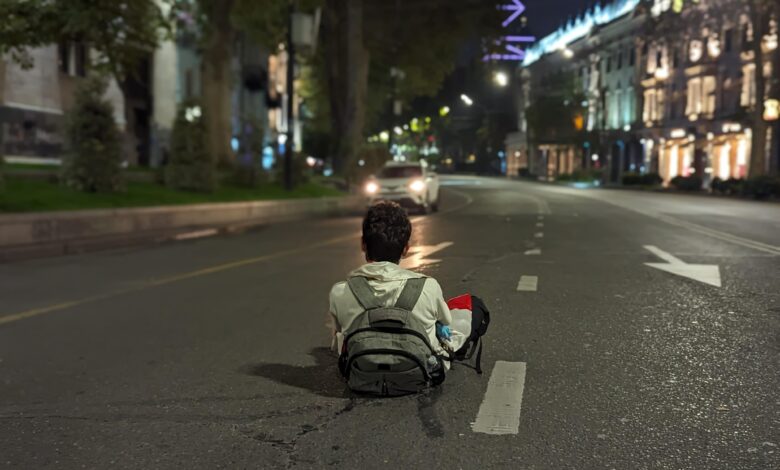
Georgian Dream Adopts Harsher Penalties For Protest Offenses
The Georgian Dream parliament has rubber-stamped a legislative package that further toughens penalties for protest-related offenses.
The package, endorsed unanimously by Georgian Dream MPs, amends the Administrative Offenses Code and the Criminal Code to increase fines and allow immediate detention for some of the protest-related violations.
The move comes after unrest in the capital on October 4, election day, and follows the ruling party’s pledge to end the anti-government and pro-EU protests on Tbilisi’s main Rustaveli Avenue, where demonstrators have been blocking the street nightly for more than 320 days.
Civil society organizations have warned that the changes aim to “ban peaceful protest,” while Georgian Dream PM Irakli Kobakhidze and other ruling party officials defended the amendments, saying a small group of people on Rustaveli Avenue should not be allowed to “oppress” the majority by blocking the street every night and that the previous fines were ineffective.
The Changes:
Violating rules on assemblies and demonstrations, including covering faces during protests, carrying pyrotechnics or intoxicating substances, “artificially” blocking roads, or erecting “temporary structures,” will now result in immediate administrative detention of up to 15 days for participants and up to 20 days for organizers, whose unlawful materials will also be confiscated.
Previously, first-time offenders faced only a fine of GEL 5,000 (about USD 1,800), which itself had been increased tenfold from GEL 500 (USD 180) last December, during the first month of the ongoing protests. Hundreds of people have already been fined for allegedly blocking Tbilisi’s central Rustaveli Avenue near Parliament, where anti-government protesters have been gathering and blocking traffic for more than 320 days. Georgian Dream members, however, have argued that the fines proved ineffective.
Repeating the above offenses, or taking part again in protests that the Interior Ministry has ordered to disband, will now be treated as a criminal offense. Offenders can face up to one year in prison, or up to two years for repeated violations. Organizers whose actions cause “serious consequences” can be sentenced to as much as four years in prison. As for participation in a protest that has been ordered to disband, it will be treated as an administrative offense for the first time and punishable by up to 60 days of detention.
Disobedience to a lawful order or demand from law enforcement, or committing another unlawful act against them, which is punishable under the Administrative Code for the first two offenses, will now be treated as a criminal offense on the third violation, carrying up to one year in prison and up to two years for subsequent offenses.
Furthermore, protesters who carry firearms, explosive, flammable, or radioactive substances, cold weapons, or who carry such items or substances that are or may be used to injure the life and health of participants of the assembly or other persons, will result in 60 days of detention. The same penalty will be on participation in assemblies disbanded by the Interior Ministry.
In the case of pregnant women, minors, women with children under 12, and individuals with disabilities, administrative detention will be replaced with a fine of GEL 5,000 (about USD 1,800), or GEL 15,000 (USD 5500) for organizers.
Banning Peaceful Protests?
Civil society organizations have warned that the amendments amount to the ruling party’s “attempt to ban peaceful protest” and “another step toward dismantling democratic institutions” in Georgia.
“With these changes, the government sends the same threat to everyone: ‘If you raise your voice, you will be arrested,’” 25 CSOs said on October 14, the day after the proposals were announced and before they were rushed through the one-party legislature in an accelerated procedure.
The Georgian Young Lawyers’ Association (GYLA), a local human rights watchdog, said in a separate statement that the changes aim to “restrict the ongoing daily protests on Rustaveli [Avenue].” The group added that with these amendments, the Georgian Dream government “establishes ‘legalized injustice,’ thereby undermining the principles of the rule of law.”
Georgian Dream officials have expressed their intention to end the ongoing protest rallies on Rustaveli Avenue, which will mark one year in about a month. Some members, including PM Irakli Kobakhidze, said the fines for road blockages have proved ineffective in ending Rustaveli protests.
Also Read:
- 07/10/2025 – Kobakhidze Offers Reset With West, Threatens to End Rustaveli Protests
- 02/07/2025 – Failure to Pay Protest Fines to Lead to Detention for Repeat Acts
- Repression in Numbers